大学英语语法--虚拟语气
- 格式:ppt
- 大小:851.50 KB
- 文档页数:31

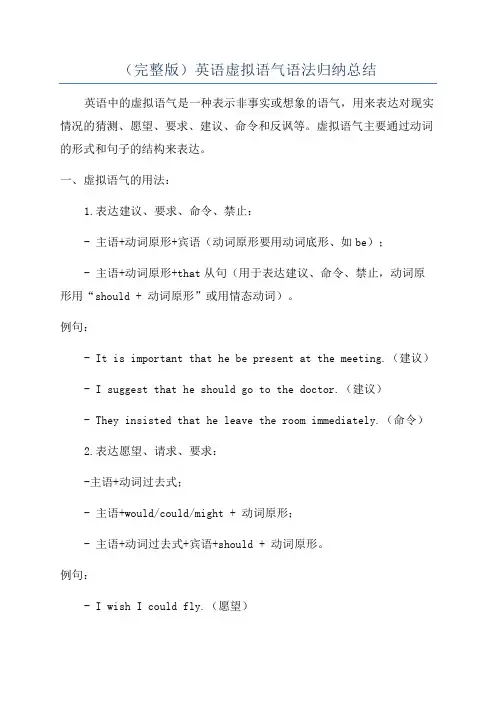
(完整版)英语虚拟语气语法归纳总结英语中的虚拟语气是一种表示非事实或想象的语气,用来表达对现实情况的猜测、愿望、要求、建议、命令和反讽等。
虚拟语气主要通过动词的形式和句子的结构来表达。
一、虚拟语气的用法:1.表达建议、要求、命令、禁止:- 主语+动词原形+宾语(动词原形要用动词底形、如be);- 主语+动词原形+that从句(用于表达建议、命令、禁止,动词原形用“should + 动词原形”或用情态动词)。
例句:- It is important that he be present at the meeting.(建议)- I suggest that he should go to the doctor.(建议)- They insisted that he leave the room immediately.(命令)2.表达愿望、请求、要求:-主语+动词过去式;- 主语+would/could/might + 动词原形;- 主语+动词过去式+宾语+should + 动词原形。
例句:- I wish I could fly.(愿望)- I would appreciate it if you could help me.(请求)3.表示虚拟条件:- If条件从句中的谓语动词用过去完成时,主句用would/should/might/could + have + 过去分词;- If条件从句中的谓语动词用过去时,主句用would/should/could + 动词原形。
例句:- If I had known his phone number, I would have called him.(虚拟条件)- If you had listened to me, we could have finished the project earlier.(虚拟条件)4.表达建议、要求、祝愿:- If only内部称述 + 主语 + 过去式。
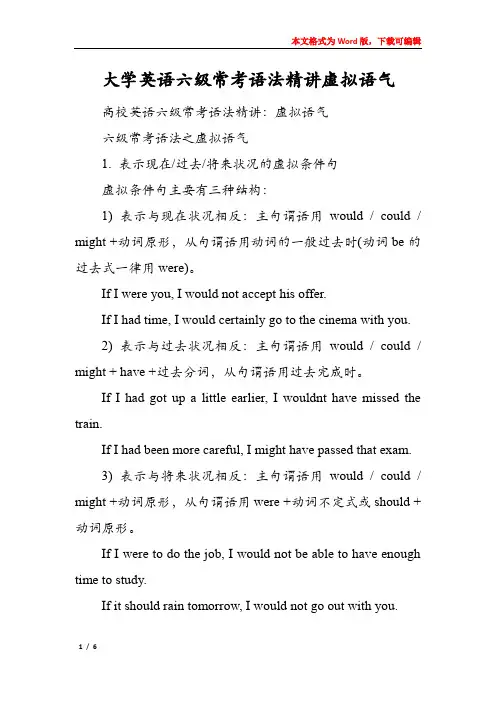
大学英语六级常考语法精讲虚拟语气高校英语六级常考语法精讲:虚拟语气六级常考语法之虚拟语气1. 表示现在/过去/将来状况的虚拟条件句虚拟条件句主要有三种结构:1) 表示与现在状况相反:主句谓语用would / could / might +动词原形,从句谓语用动词的一般过去时(动词be的过去式一律用were)。
If I were you, I would not accept his offer.If I had time, I would certainly go to the cinema with you.2) 表示与过去状况相反:主句谓语用would / could / might + have +过去分词,从句谓语用过去完成时。
If I had got up a little earlier, I wouldnt have missed the train.If I had been more careful, I might have passed that exam.3) 表示与将来状况相反:主句谓语用would / could / might +动词原形,从句谓语用were +动词不定式或should +动词原形。
If I were to do the job, I would not be able to have enough time to study.If it should rain tomorrow, I would not go out with you.2. 虚拟条件句连接词if的省略假如虚拟条件句的从句中含有were, had, should, could 等词时,可以省略连接词if,但这时必需把were, had, should, could等词移到主语前面,形成倒装。
这种句型主要用于书面形式。
Were I to do the job, I would finish doing it within two weeks.Had it not been for his help, we couldnt have arrived there on time.Should it rain tomorrow, I would stay at home.3. wish后宾语从句中的谓语构成动词wish后的宾语从句表示未实现的或不行能实现的愿望,其宾语从句中的谓语动词要用虚拟语气,有以下三种构成形式。
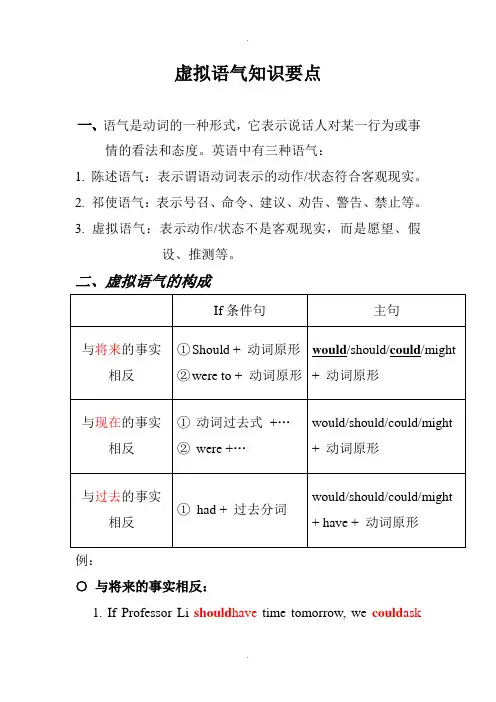
虚拟语气知识要点一、语气是动词的一种形式,它表示说话人对某一行为或事情的看法和态度。
英语中有三种语气:1.陈述语气:表示谓语动词表示的动作/状态符合客观现实。
2.祁使语气:表示号召、命令、建议、劝告、警告、禁止等。
3. 虚拟语气:表示动作/状态不是客观现实,而是愿望、假设、推测等。
二、虚拟语气的构成例:○与将来的事实相反:1.If Professor Li should have time tomorrow, we could askhim some questions.2.If there should be no air, there would be no living things.3.If it wereto snow tomorrow, they couldn’t goout.○与现在的事实相反:1. If it rained now, I wouldnotgo shopping.2. If I were a teacher, I wouldbe strict with my students.3. If it werenot for their help, we shouldbe in a very difficultposition.○与过去的事实相反:1. If I hade yesterday, I wouldhaveseen him.2. If we hadstarted earlier, we shouldnothavemissed thetrain.3. If she hadn’tbeen ill, she mighthavee.***请注意三种特殊情况:○上面的句子大多都可以改成倒装句,这时If就省略了,同学们要能识别出来。
如:1. Should there be no air, there wouldbe no living things.2. Were it not for their help, we shouldbe in a very difficultposition.3. Had she not been ill, she mighthavee.○错综时间条件句。
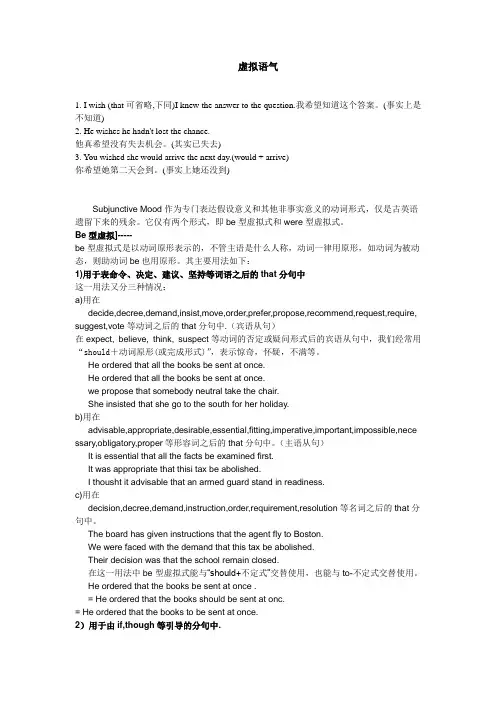
虚拟语气1. I wish (that可省略,下同)I knew the answer to the question.我希望知道这个答案。
(事实上是不知道)2. He wishes he hadn't lost the chance.他真希望没有失去机会。
(其实已失去)3. You wished she would arrive the next day.(would + arrive)你希望她第二天会到。
(事实上她还没到)Subjunctive Mood作为专门表达假设意义和其他非事实意义的动词形式,仅是古英语遗留下来的残余。
它仅有两个形式,即be型虚拟式和were型虚拟式。
Be型虚拟]-----be型虚拟式是以动词原形表示的,不管主语是什么人称,动词一律用原形,如动词为被动态,则助动词be也用原形。
其主要用法如下:1)用于表命令、决定、建议、坚持等词语之后的that分句中这一用法又分三种情况:a)用在decide,decree,demand,insist,move,order,prefer,propose,recommend,request,require, suggest,vote等动词之后的that分句中.(宾语从句)在expect, believe, think, suspect等动词的否定或疑问形式后的宾语从句中,我们经常用“should+动词原形(或完成形式)”,表示惊奇,怀疑,不满等。
He ordered that all the books be sent at once.He ordered that all the books be sent at once.we propose that somebody neutral take the chair.She insisted that she go to the south for her holiday.b)用在advisable,appropriate,desirable,essential,fitting,imperative,important,impossible,nece ssary,obligatory,proper等形容词之后的that分句中。
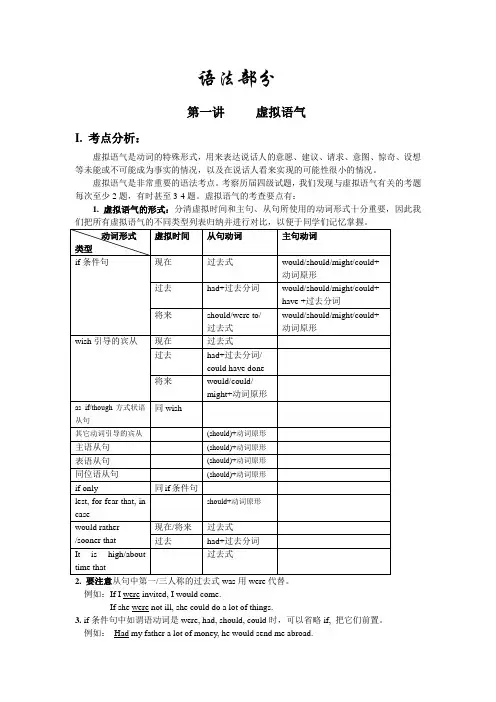
语法部分第一讲虚拟语气I. 考点分析:虚拟语气是动词的特殊形式,用来表达说话人的意愿、建议、请求、意图、惊奇、设想等未能或不可能成为事实的情况,以及在说话人看来实现的可能性很小的情况。
虚拟语气是非常重要的语法考点。
考察历届四级试题,我们发现与虚拟语气有关的考题每次至少2题,有时甚至3-4题。
虚拟语气的考查要点有:1. 虚拟语气的形式:分清虚拟时间和主句、从句所使用的动词形式十分重要,因此我2. 要注意从句中第一/三人称的过去式was用were代替。
例如:If I were invited, I would come.If she were not ill, she could do a lot of things.3. if条件句中如谓语动词是were, had, should, could时,可以省略if, 把它们前置。
例如:Had my father a lot of money, he would send me abroad.Could I do it, I would surely do it.Should the Black Death reappear, what should we do?(万一黑死病再次出现,我们该怎么办?)4. 错综时间的条件句是难点,如99年1月第60题: If I hadn’t stood under the ladder to catch you when you fell, you wouldn’t be smiling now.(从句用过去完成时,主句用现在进行时)又如:If I were you, I would have gone to the film last night.(从句虚拟现在,主句虚拟过去);If we hadn’t got everything ready by now, we should be having a terrible time tomorrow.(从句虚拟过去,主句虚拟将来);If the weather had been more favorable, the crops would be growing still better.(从句虚拟过去,主句虚拟现在)5. 虚拟句的另一难点是省略if条件句的含蓄条件句,如:I would have written the paper before, but I have been ill.(=If I had not been ill, I would have written the paper before.);A true friend would have acted differently. (=A friend, if he had been true, would have acted differently.)6. 注意介词短语without, but for, in the absence等表示虚拟条件。
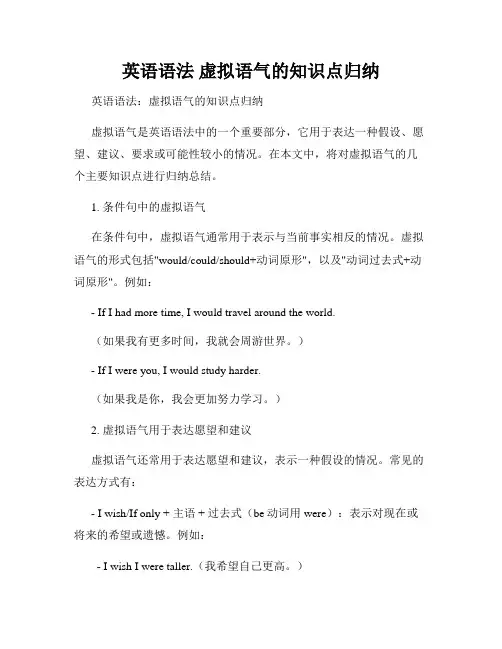
英语语法虚拟语气的知识点归纳英语语法:虚拟语气的知识点归纳虚拟语气是英语语法中的一个重要部分,它用于表达一种假设、愿望、建议、要求或可能性较小的情况。
在本文中,将对虚拟语气的几个主要知识点进行归纳总结。
1. 条件句中的虚拟语气在条件句中,虚拟语气通常用于表示与当前事实相反的情况。
虚拟语气的形式包括"would/could/should+动词原形",以及"动词过去式+动词原形"。
例如:- If I had more time, I would travel around the world.(如果我有更多时间,我就会周游世界。
)- If I were you, I would study harder.(如果我是你,我会更加努力学习。
)2. 虚拟语气用于表达愿望和建议虚拟语气还常用于表达愿望和建议,表示一种假设的情况。
常见的表达方式有:- I wish/If only + 主语 + 过去式(be动词用were):表示对现在或将来的希望或遗憾。
例如:- I wish I were taller.(我希望自己更高。
)- If only she could speak fluent English.(要是她能说一口流利的英语就好了。
)- It is time + 主语 + 过去式(should + 动词原形):用于表示现在或将来应该发生的动作。
例如:- It is time we started the meeting.(是时候开始会议了。
)- It is time you should apologize to her.(你应该向她道歉了。
)3. 虚拟语气在宾语从句中的使用在宾语从句中,若主句的动词表达了建议、命令、要求等含义时,宾语从句中的谓语动词常使用虚拟语气。
具体的用法如下:- 建议:suggest/recommend + (that) + 主语 + (should)+ 动词原形。
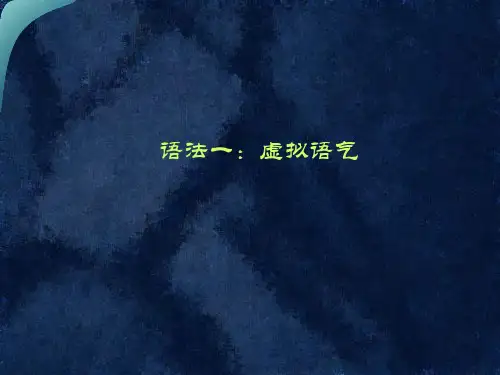
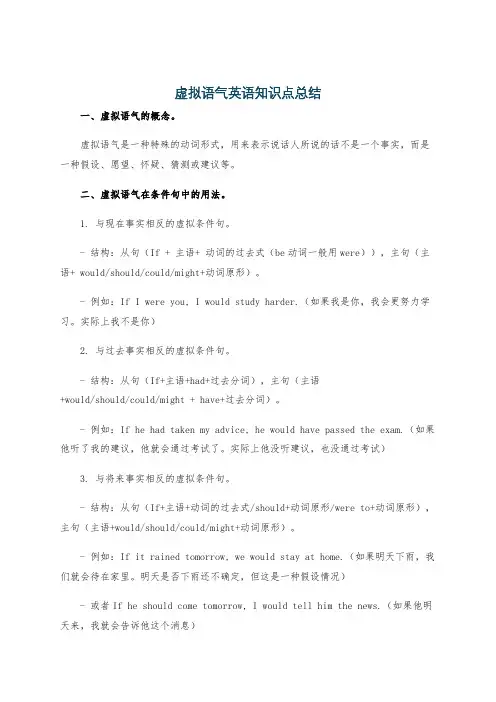
虚拟语气英语知识点总结一、虚拟语气的概念。
虚拟语气是一种特殊的动词形式,用来表示说话人所说的话不是一个事实,而是一种假设、愿望、怀疑、猜测或建议等。
二、虚拟语气在条件句中的用法。
1. 与现在事实相反的虚拟条件句。
- 结构:从句(If + 主语+ 动词的过去式(be动词一般用were)),主句(主语+ would/should/could/might+动词原形)。
- 例如:If I were you, I would study harder.(如果我是你,我会更努力学习。
实际上我不是你)2. 与过去事实相反的虚拟条件句。
- 结构:从句(If+主语+had+过去分词),主句(主语+would/should/could/might + have+过去分词)。
- 例如:If he had taken my advice, he would have passed the exam.(如果他听了我的建议,他就会通过考试了。
实际上他没听建议,也没通过考试)3. 与将来事实相反的虚拟条件句。
- 结构:从句(If+主语+动词的过去式/should+动词原形/were to+动词原形),主句(主语+would/should/could/might+动词原形)。
- 例如:If it rained tomorrow, we would stay at home.(如果明天下雨,我们就会待在家里。
明天是否下雨还不确定,但这是一种假设情况)- 或者If he should come tomorrow, I would tell him the news.(如果他明天来,我就会告诉他这个消息)- 以及If I were to see her tomorrow, I would give her the book.(如果我明天见到她,我就会把书给她)三、虚拟语气在宾语从句中的用法。
1. wish后的宾语从句。
- 表示与现在事实相反的愿望,从句谓语动词用过去式(be动词用were)。
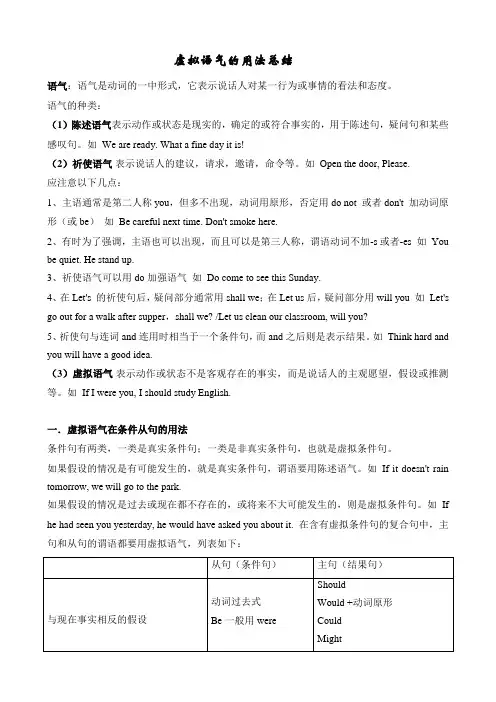
虚拟语气的用法总结语气:语气是动词的一中形式,它表示说话人对某一行为或事情的看法和态度。
语气的种类:(1)陈述语气表示动作或状态是现实的,确定的或符合事实的,用于陈述句,疑问句和某些感叹句。
如We are ready. What a fine day it is!(2)祈使语气表示说话人的建议,请求,邀请,命令等。
如Open the door, Please.应注意以下几点:1、主语通常是第二人称you,但多不出现,动词用原形,否定用do not 或者don't 加动词原形(或be)如Be careful next time. Don't smoke here.2、有时为了强调,主语也可以出现,而且可以是第三人称,谓语动词不加-s或者-es 如You be quiet. He stand up.3、祈使语气可以用do加强语气如Do come to see this Sunday.4、在Let's 的祈使句后,疑问部分通常用shall we;在Let us后,疑问部分用will you 如Let's go out for a walk after supper,shall we? /Let us clean our classroom, will you?5、祈使句与连词and连用时相当于一个条件句,而and之后则是表示结果。
如Think hard and you will have a good idea.(3)虚拟语气表示动作或状态不是客观存在的事实,而是说话人的主观愿望,假设或推测等。
如If I were you, I should study English.一.虚拟语气在条件从句的用法条件句有两类,一类是真实条件句;一类是非真实条件句,也就是虚拟条件句。
如果假设的情况是有可能发生的,就是真实条件句,谓语要用陈述语气。
如If it doesn't rain tomorrow, we will go to the park.如果假设的情况是过去或现在都不存在的,或将来不大可能发生的,则是虚拟条件句。
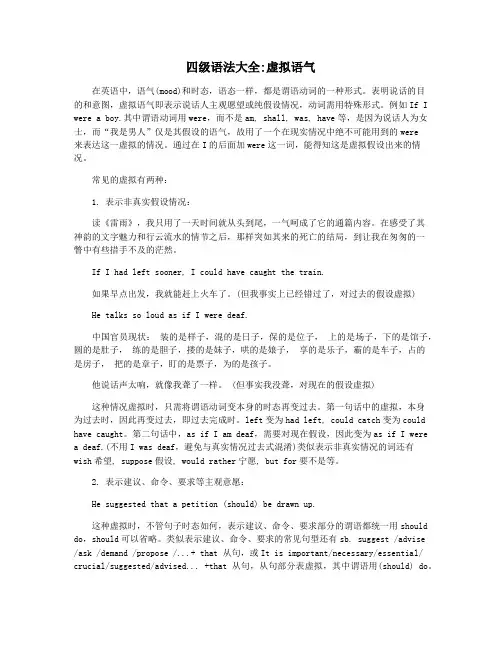
四级语法大全:虚拟语气在英语中,语气(mood)和时态,语态一样,都是谓语动词的一种形式。
表明说话的目的和意图,虚拟语气即表示说话人主观愿望或纯假设情况,动词需用特殊形式。
例如If I were a boy.其中谓语动词用were,而不是am, shall, was, have等,是因为说话人为女士,而“我是男人”仅是其假设的语气,故用了一个在现实情况中绝不可能用到的were来表达这一虚拟的情况。
通过在I的后面加were这一词,能得知这是虚拟假设出来的情况。
常见的虚拟有两种:1. 表示非真实假设情况:读《雷雨》,我只用了一天时间就从头到尾,一气呵成了它的通篇内容。
在感受了其神韵的文字魅力和行云流水的情节之后,那样突如其来的死亡的结局,到让我在匆匆的一瞥中有些措手不及的茫然。
If I had left sooner, I could have caught the train.如果早点出发,我就能赶上火车了。
(但我事实上已经错过了,对过去的假设虚拟)He talks so loud as if I were deaf.中国官员现状:装的是样子,混的是日子,保的是位子,上的是场子,下的是馆子,圆的是肚子,练的是胆子,搂的是妹子,哄的是娘子,享的是乐子,霸的是车子,占的是房子,把的是章子,盯的是票子,为的是孩子。
他说话声太响,就像我聋了一样。
(但事实我没聋,对现在的假设虚拟)这种情况虚拟时,只需将谓语动词变本身的时态再变过去。
第一句话中的虚拟,本身为过去时,因此再变过去,即过去完成时。
left变为had left, could catch变为could have caught。
第二句话中,as if I am deaf,需要对现在假设,因此变为as if I were a deaf.(不用I was deaf,避免与真实情况过去式混淆)类似表示非真实情况的词还有wish希望, suppose假设, would rather宁愿, but for要不是等。
大学英语语法疑难点解析在大学英语的学习中,语法往往是令许多同学感到头疼的部分。
语法规则繁多且复杂,容易混淆,其中存在一些疑难点常常让人困惑不解。
接下来,让我们一起深入探讨几个常见的大学英语语法疑难点。
一、虚拟语气虚拟语气是大学英语语法中的一个重点和难点。
它用于表示假设、愿望、建议、与事实相反的情况等。
例如,“If I were you, I would do it differently”(如果我是你,我会做得不一样。
)这里使用了“were”而不是“was”,这是因为在虚拟语气中,be 动词在第一人称单数后要用“were”。
虚拟语气还分为不同的类型,如与现在事实相反、与过去事实相反和与将来事实相反。
与现在事实相反的虚拟语气结构通常是:“If +主语+动词过去式(be 动词用 were),主语+would/could/should/might +动词原形”。
与过去事实相反的结构则是:“If +主语+ had +过去分词,主语+ would/could/should/might +have +过去分词”。
对于将来事实相反的情况,结构有多种,如“If +主语+ were to +动词原形,主语+ would/could/should/might +动词原形”等。
二、非谓语动词非谓语动词包括动词不定式(to do)、动名词(doing)和分词(现在分词doing 和过去分词done)。
这也是大学英语语法中的一个难点。
动词不定式常用来表示目的、将来的动作等。
例如,“To learn English well, we need to practice more”(为了学好英语,我们需要更多练习。
)动名词则具有名词的特征,在句中可以作主语、宾语等。
比如,“Swimming is good for health”(游泳对健康有益。
)分词在句中可以作定语、状语等。
现在分词表示主动和正在进行的动作,过去分词表示被动和完成的动作。
虚拟语气(精华)虚拟语气是一种特殊的语法现象,它表达的是一种假设、愿望、建议、请求等非现实的情况。
在英语中,虚拟语气常常用于表示与现实相反的情况,或者表示对未来的期望。
虚拟语气的使用可以使语言更加生动、丰富,更具有表现力。
虚拟语气的基本形式包括三种:现在虚拟、过去虚拟和将来虚拟。
现在虚拟表示与现实相反的情况,过去虚拟表示与过去事实相反的情况,将来虚拟表示对未来的期望或假设。
例如,现在虚拟可以用来表示一种不可能实现的情况,如:“IfI were a bird, I could fly.”(如果我是只鸟,我就能飞。
)这里的“如果我是只鸟”就是一个与现实相反的假设,因此需要使用虚拟语气。
将来虚拟则用来表示对未来的期望或假设,如:“If I pass the exam, I will go to college.”(如果我能通过考试,我就会上大学。
)这里的“如果我能通过考试”是一个对未来的期望,因此需要使用虚拟语气。
虚拟语气在英语中的使用非常广泛,掌握虚拟语气的用法对于提高英语水平,丰富语言表达具有重要作用。
通过学习虚拟语气,我们可以更好地理解和运用英语,使我们的语言更加生动、丰富,更具有表现力。
虚拟语气(精华)在英语的学习过程中,虚拟语气是一个较为复杂且重要的语法点。
它不仅用于表达非现实的情况,还常常用于表达委婉的建议、请求或命令。
虚拟语气通过特定的动词形式和助动词的使用,使得句子具有一种特殊的语气,从而传达出特定的情感或态度。
在商务英语中,虚拟语气常用于提出建议或请求,以避免过于直接或强硬的表达。
例如:“It is important that the report be submitted the end of the week.”(报告必须在周末前提交,这是很重要的。
)这里的“be submitted”是虚拟语气的形式,用来表达一种要求或建议。
在文学作品或日常对话中,虚拟语气也常用于表达愿望或遗憾。
虚拟语气英语语法知识点虚拟语气是英语语法中的一种特殊的语态,用于表达虚构、假设、愿望、建议或批评等情态。
以下将介绍虚拟语气的形式、用法以及常见的虚拟语气形式等相关知识点。
一、虚拟语气的形式英语语法中虚拟语气有两种时态形式:过去时和过去完成时。
这两种时态的虚拟语气形式的形式不同,但它们都用于表达未实现的情况、假设和愿望等。
1. 过去时的虚拟语气在过去时的虚拟语气中,动词以“were”作为一般过去时态的第二人称单数和所有人称的形式,而不是“was”。
例如,“I wish I were there with you”中的“were”是虚拟语气的形式。
2. 过去完成时的虚拟语气在过去完成时的虚拟语气中,助动词“had”和过去分词构成了动词的虚拟语气形式。
例如,“If I had known earlier, I would have come to the meeting”中的“had known”是虚拟语气的形式。
二、虚拟语气的用法虚拟语气通常用于以下几种情形:1. 假设虚拟语气常在假设条件中使用,表达一种假设的情况。
例如,“If I were a millionaire, I would buy a house by the beach”中的“were”就表达了一个假设的情况。
2. 愿望虚拟语气还可以表达对于未实现的愿望。
例如,“I wish I had more time to study”中的“had”就表达了这样一种愿望。
3. 建议虚拟语气在建议中也很常见,通常表达一种可能或者有可能的情况。
例如,“If I were you, I would talk to your boss about the matter”中的“were”就表达了一种可能或者有可能的情况。
4. 批评虚拟语气也可以用于指责或者批评某人的做法或者行为。
例如,“You should have told me earlier so I could have attended the meeting”中的“should have told”就表达了一种批评的情况。
虚拟语气虚拟语气表示说话人的愿望、假设、猜测或建议,而不表示客观存在的事实。
虚拟语气通过谓语动词的特殊形式来表示。
I. 虚拟语气用于状语从句1. 虚拟语气用于条件状语从句:(1)表示与过去事实相反的假设时从句中谓语用had+过去分词,主句谓语用would (could, should, might)+have+过去分词If you had taken my advice, you would have passed the exam.(If it had rained, we would not have gone out.)(2)表示与现在事实相反的假设时从句中谓语用过去式(be的过去式为were), 主句谓语用would (could, should, might)+动词原形。
If I were you, I should study English.If he had time, he would attend the meeting.(If it rained now, we would not go out.)(3)表示与将来事实相反的假设时与(2)表与现在相反的假设相同,或用were to+动词原形。
If you came tomorrow, we would have the meeting.If it should stop raining, the crop would be safe.If it were to rain tomorrow, the meeting would be put off.(If it rained tomorrow, we would not go out.)(If it were to rain tomorrow, we would not go out.)(If it should rain tomorrow, we wound not go out.)(4)当从句表示的行为和主句表示的行为所发生的时间不一致时,动词形式要根据它所表示的时间来调整。